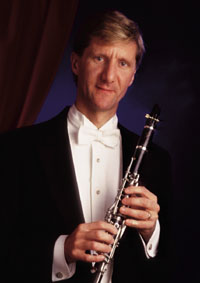 David H. Thomas has been an orchestral clarinetist for 25 years. Additionally, he is also an experienced soloist, with numerous critically acclaimed performances.
David H. Thomas has been an orchestral clarinetist for 25 years. Additionally, he is also an experienced soloist, with numerous critically acclaimed performances.
Starting his performing career directly after undergraduate studies, he won a position with the Greensboro Symphony in 1982. The next year he was offered the principal position of the Kennedy Center Opera House Orchestra in Washington, DC. The grueling demands of opera and ballet repertoire honed his skills as a versatile player. In 1989, he won the principal clarinet position of the Columbus Symphony in Ohio.
A noted orchestra among several giants in Ohio, the Columbus Symphony had its Carnegie Hall debut in 2001. The review was glowing.
For the past 16 years David has impressed audiences with his music making, both as orchestral and solo performer. Columbus Dispatch chief critic Barbara Zuck offered these comments in a 1994 review of Thomas' rendition of Rossini's Introduction, Theme and Variations:
"Thomas, ...has steadily grown in stature and confidence. Even so, I'm not sure anyone was prepared for the absolutely bravura display of virtuosity Thomas delivered last night. Who would have expected him to emerge as the clarinet equivalent of Cecilia Bartoli? I don't recall a bigger or better reception for any artist, anywhere."
From an April 30, 2005 review of the CSO in a concert of opera overtures and tenor arias, Zuck noted: "(Thomas) had as many great lines as the singer, and his brilliant performances once again reminded us how his playing has spoiled us over the years."
Latest Posts
Mahler and Bob
Back to Work
Month Off
Floating through Summer
Jazz yoga
Summer Season
Truth Through Music
Music Recordings Byte Reality
Archives
06/12 - 06/19
06/26 - 07/03
07/10 - 07/17
07/31 - 08/07
10/09 - 10/16
11/13 - 11/20
12/04 - 12/11
12/18 - 12/25
01/01 - 01/08
01/22 - 01/29
02/26 - 03/05
09/10 - 09/17
10/01 - 10/08
10/22 - 10/29
11/05 - 11/12
12/03 - 12/10
03/11 - 03/18
03/18 - 03/25
04/22 - 04/29
06/17 - 06/24
07/08 - 07/15
10/28 - 11/04
01/13 - 01/20
04/27 - 05/04
05/04 - 05/11
05/18 - 05/25
07/06 - 07/13
07/13 - 07/20
08/24 - 08/31
11/09 - 11/16
12/21 - 12/28
|

12/07/2005
Reeds
Reeds are our saviors. We can blame anything on them, thank goodness. "Oops, I squeaked! Oh well, that wasn't a great reed after all." Or, "Man, I can't believe how much my reed's changed since two hours ago. No wonder I'm having trouble with that run!" Oh yes, the weather is our second savior. From November through March we're off the hook. No need to practice, since it wastes reed which could be saved for performances.
But really, we do struggle with those neurotic slivers of bamboo, thinner than finger nails. My students ask me how to "fix" them and I answer, "Try something. If it works, don't expect it to work on the next reed, but it might. If it doesn't work, it may work on the next reed, or not." There, does that clarify things?
Now don't go asking oboists what they think of clarinetists complaining about reeds! They have no idea how much energy it takes to order the boxes, open them, wet all the reeds, try them, and throw half away. It's utter agony to throw away what was once a living thing! Ok, I'm being silly. The real problem clarinetists face is how little control we have over the finished reed, since we buy ours already made. Yes, we could make our own as oboists and bassoonists must, but that would take their drama away, so we suffer through the drudgery of opening boxes and making friends with reeds we hardly know.
I usually just slap them on the mouthpiece and blow. If it does somthing I like, I spend some time balancing the tip, which means shaving the thick parts to get the reed vibrating evenly. Then I usually put the poor water logged thing away to recover from surgery. I do this a few times, ususally during breaks at rehearsals or while practicing work stuff at home. I almost never work on reeds without multitasking. After a few trys, the reed either begins to settle down and behave, or it loses my interest. I give reeds lots of leeway to improve. I experiment on dubious sounding reeds, sacrificing them in the name of science, sculpting them just to see what it does to their sound. Occasionally one will surprise me and return from the dead to become something I actually use in a real rehearsal or performance. So though I'm brutal with them, I give each one a fair chance.
A good reed is not a universal constant. One reed may work for one piece or concert, but will not for another type of music. A jazzy reed for the beginning of Rhapsodie in Blue may not work for the Mozart Symphony on the second half. Reeds are like wine, better drunk before their brief glory is faded with age. I don't believe in saving reeds, putting them back for a rainy day. Each day my good reed might be a different one than the day before. I keep three or four top ones and six to eight others in rotation as any one time, while bringing a few dozen new ones into possible daily usage.
David H. Thomas
| |



